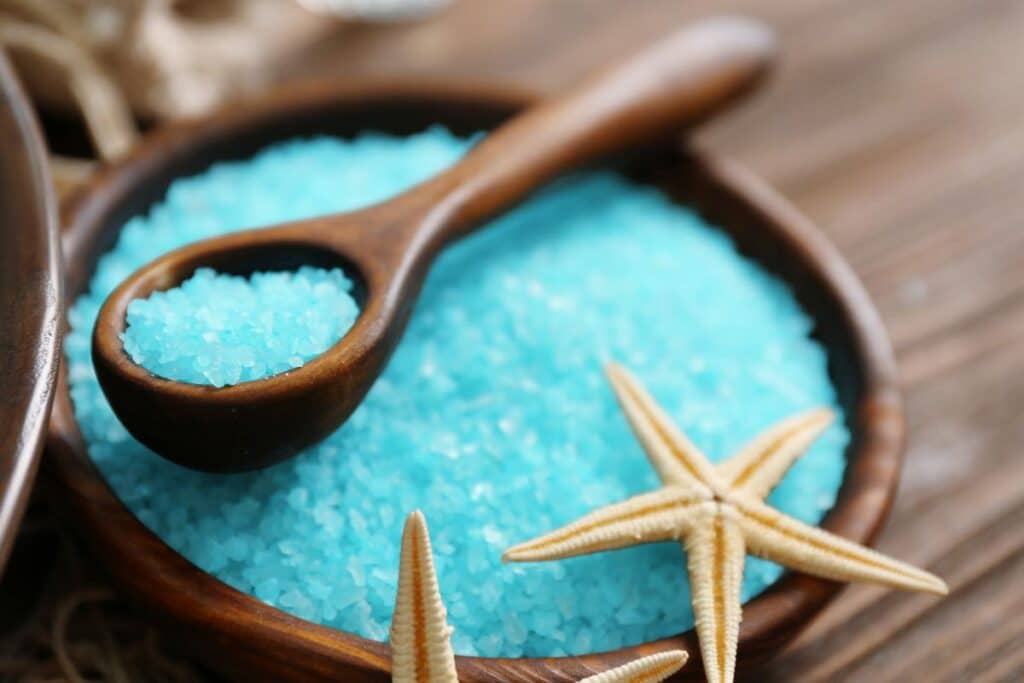After an intense workout session or a long day that’s left your muscles aching, the thought of a warm Epsom salt bath can be very appealing. But does it really help with muscle recovery, or is it just a placebo effect wrapped in a relaxing spa treatment? This article dives into the science behind Epsom salt baths and whether they can genuinely aid in muscle recovery.
What is Epsom Salt?
Epsom salt is also known as magnesium sulfate, a chemical compound containing magnesium, sulfur, and oxygen. Also, it’s named after the town of Epsom in Surrey, England, where it was originally discovered. Unlike table salt, which is sodium chloride, Epsom salt has a different chemical composition and is known for its purported therapeutic properties.
The Claims
Advocates for Epsom salt baths believe that soaking in a bath with dissolved Epsom salt can:
- Ease muscle soreness
- Reduce inflammation
- Alleviate pain from minor sprains and bruises
- Promote relaxation and stress reduction
- Aid in the body’s natural detoxification processes
The central claim around Epsom salt baths for muscle recovery is that the magnesium and sulfate are absorbed through the skin, replenishing your body’s levels of these elements, which can be depleted during physical stress and exercise.
The Science of Magnesium Absorption
The most important claim to evaluate is whether or not Epsom salts can indeed be absorbed through the skin. Skin, our largest organ, is semipermeable, which means while it’s excellent at keeping certain substances out, it can allow others in under the right circumstances.
Research on transdermal absorption of magnesium is limited and mixed. Some studies suggest that soaking in an Epsom salt bath can raise magnesium levels in the body, which is essential for muscle function, as magnesium plays a critical role in neuromuscular signals and muscle contractions. However, other experts argue that the skin’s ability to absorb magnesium to a level that would have systemic health effects is minimal.
Magnesium’s Role in Muscle Recovery
Let’s assume, for the moment, that magnesium can be absorbed through the skin. Why is magnesium important for muscle recovery?
Magnesium is a natural muscle relaxant, which is why deficiencies in this mineral can lead to cramping and tension. It is also essential for energy production at the cellular level and is involved in synthesizing protein, which muscles need to repair and rebuild after exertion.
Inflammation and Detoxification
Epsom salt baths are also said to help with inflammation and detoxification. While soaking in warm water can indeed help increase blood flow and potentially ease inflammatory responses, the role of Epsom salts in this process is less clear. Also, there’s scant scientific evidence supporting the claim that Epsom salts actively reduce inflammation or assist in detoxifying the body. The warmth of the bath itself may help to temporarily relieve muscle soreness by increasing circulation and relaxing tight muscles.
The Verdict
While the experience of a warm Epsom salt bath can be soothing, and anecdotal evidence abounds for its effectiveness in aiding muscle recovery, there’s a lack of robust scientific evidence to fully back these claims. Also, the placebo effect — where simply believing that a treatment works can lead to perceived improvements in symptoms — may also play a role in the reported benefits of Epsom salt baths.
Practical Advice
If you enjoy Epsom salt baths and find they help you relax and feel better, there’s no harm in continuing to use them as part of your muscle recovery routine. Relaxation, stress reduction, and comfort are, after all, beneficial for overall recovery and health.
For those looking for evidence-based muscle recovery strategies, it’s important to focus on proven methods like:
- Adequate hydration
- Proper nutrition with enough protein and electrolytes
- Active recovery such as light exercise on rest days
- Sufficient sleep for muscle repair and recovery
Conclusion
Epsom salt baths can be a relaxing and enjoyable way to wind down after a workout, and they may offer indirect muscle recovery benefits through relaxation and improved circulation from the warm water. However, when it comes to direct benefits like reducing inflammation or detoxifying, the science doesn’t provide a clear endorsement.
For the best approach to muscle recovery, combine methods supported by a wealth of scientific evidence with those personal practices that you find beneficial. Also, the key is to listen to your body and do what feels right for you. If you love bodybuilding, share this article on Facebook or Twitter so that others can learn more about building muscle.
Related Article
.




